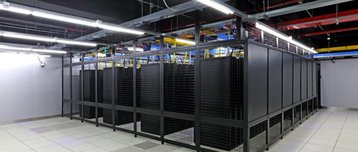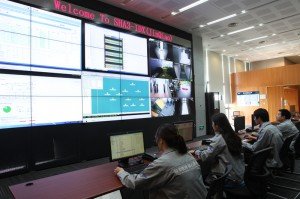Owned by the Chinese government, Shanghai Data Solution (SDS) built its first small network communications site in 2001, and has grown with China’s online economy. Since then, it has built data centers for the Chinese bank card provider Unionpay, and brought online IDX Blue Light, Jinqiao and Beijing data centers.
DatacenterDynamics visited the lDX Jinqiao data center in Shanghai, SDS’ second big high-tier facility, built after the IDX Blue Light data center. Coming online in 2013, it has a floorspace of 13,000 sq m (about 130,000 sq ft) and embodies some advanced techniques in its construction and operation.
An important milestone
“IDX Jinqiao represents an important milestone in building, operating and maintaining our data centers,” Richy Wu, general manager of SDS’ operation and service center told us.
The center has access to network connections from China Telecom, China Unicom and China Mobile, as well as its own border gateway protocol (BGP), which aims to set up a high-speed transmission network covering the whole Shanghai region.
“Though our IDX Jinqiao Data Center has not gone through Tier IV certification, we invited IBM to do the design and deploy our hardware in accordance with the standards used by international operators and large financial institutions. Redundancy design is applied to all of our systems, from heating and ventilation to power supply and distribution, to avoid any single point of failure and ensure stability of the hosting environment,” Mr Wu told us.
The center mainly provides colocation services to high-end customers including financial institutions, R&D companies and multinational enterprises.
Many Innovations
Compared with previous data centers built by SDS, the IDX Jinqiao data center has made numerous innovations in power supply, cooling, cabling and access control, Mr Wu told us.
Instead of using traditional rack-mounted static transfer switches (STS), the data center deploys large cabinet-style STS. This means that PDUs are no longer installed in racks, but embedded in an independent wall. ”The new cabinet-style system offers a static switch between route A and route B and supports 40 to 60 outlets, hence ensuring higher availability and security, and shorter switch time,” Mr Wu explained.
IDX Jinqiao is also SDS’ first data center to introduce water-based cooling, complemented by plate heat exchangers. “Water-based cooling, though involving higher upfront investment, is more energy efficient and cost effective in the long term,” said Mr Wu. ”In addition, we combine it with plate heat exchangers in accordance with Shanghai’s climate conditions. As temperature drops at a certain point, plate heat exchangers can be enabled to offer complementary cooling capacity. Our designed PUE is 1.5, which is much better than the 2.0 value commonly seen in data centers using air-based cooling in China.”
Energy efficiency and reliability can seem to be a contradiction for data centers. Will the Jinqiao facility achieve high energy efficiency at the cost of compromising reliability? Mr Wu’s answer is “No”.
“Within our Jinqiao data center, we ensure high energy efficiency without sacrificing reliability by adopting an enclosed design to keep temperature constant, deploying highly efficient compressors, optimizing heat and ventilation systems, and configuring management systems to ensure accurate control of air flow,” he explained.
The center can also offer customized cooling solutions to customers, using high density cabinets, said Mr Wu: “For high-density cabinets, we can do some special airflow interference, such as adding a heat exchanger at the back of a cabinet, using in-row cooling to cater for a high demand for cooling per unit area.”
Data centers need to manage their cabling systems to reduce energy consumption and minimize maintenance and risk. Mr Wu told us IDX Jinqiao is the first commercial data center in China to deploy electronic patch panels.
“Customers like payment companies, who connect to various telecommunication operators’ networks, can monitor in real time the connection status on various cables and physical routes, and identify and locate problems in a quick way,” he said. ”Moreover, electronic patch panels help to avoid human mistakes in installing, dismantling and adjusting cabling systems.”
Apart from innovations made in cooling, power supply and cabling management, the Jinqiao facility is deploying an access management system developed by SDS itself to meet customers’ demand for both security and convenience.
Customers need high security, which requires a strict identity check before access is permitted, but they also need quick entry to the venue when incidents occur so they can be resolved rapidly, Mr Wu said. To meet these two demands, after in-depth discussion with entrance guard vendors, SDS developed its own access control system: “This system strikes a good balance between security and convenience, and helps to shorten the process from issuing an access request, to reviewing the request and then giving the permit for entry,” Mr Wu explained.
Future plans based on current portfolio
SDS started its business as a communication service provider in 2001, expanded into the colocation market in 2013. Since then, it has embarked on a construction spree, with projects ranging from the 2,000 sq m Unionpay data center in 2006, to the 8,000 sq m IDX Blue Light data center in 2008.
“The IDX Jinqiao data center demonstrates that both our production capacity and business volume are doubled,” Mr Wu commented.
Till now, SDS has served government bodies including the Shanghai Real Estate Bureau and Shanghai Meteorological Service, and state-owned banks including the Industrial and Commercial Bank of China, as well as multinational companies including Siemens and Sony.
SDS is investing and constructing data centers in an orderly way. “In the future, we may build several large independent data centers, each with a size of about 10,000 sq m. This year, we have planned a 12,000 sq m data center in Heqing, which is close to Shanghai Financial Information Service Industrial Park, aiming to provide highly reliable hosting environment for financial customers.”
Mr Wu said data centers will be subject to further divisions in terms of the industries they serve, and SDS will focus more on its core business model. “Customers of a certain industry will share some requirements in terms of the colocation venue, and operation and maintenance standards. Some data centers targeted at customers of a certain industry, will provide one-in-all solutions which may include application and asset management. SDS is also considering rolling out such solutions for customers from the financial and medical care industry.”
For more China data center news, please visit http://dcd-group.cn/.


